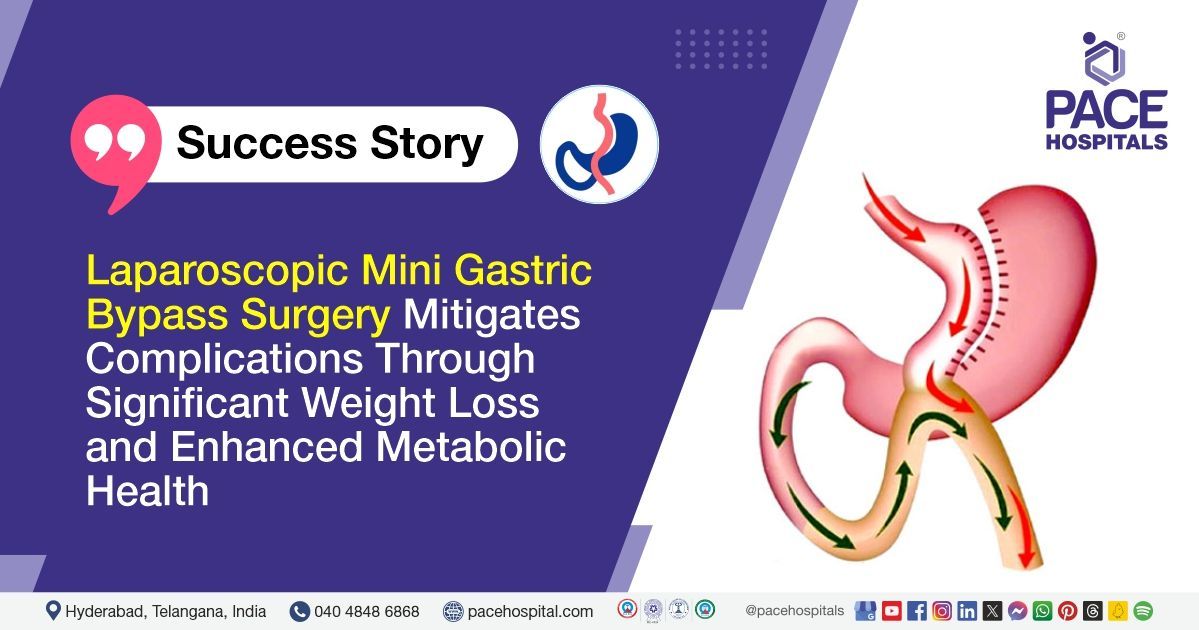Laparoscopic Mini Gastric Bypass: Reducing Complications Through Weight Loss & Metabolic Health Improvement
PACE Hospitals
PACE Hospitals' Bariatric and Metabolic Surgery team expertly executed a Laparoscopic Mini Gastric Bypass, facilitating substantial weight loss and markedly improving the patient’s metabolic health.
A 31-year-old male patient with morbid obesity (BMI - 50) was presented at
PACE Hospitals, HITEC City, Hyderabad.
Medical History and Diagnosis
Examining in greater detail, it was understood that the patient had been experiencing morbid obesity, with a complaint of recent weight gain in the last 15 days, which led to his admission to PACE Hospitals for additional care and management.
The patient has no known history of surgery, allergies, or complaints, including nausea, vomiting, or loose stools.
Upon admission to PACE Hospitals and after a thorough history and physical examination, as well as evaluation of diagnostic investigations, the patient was diagnosed with morbid obesity (BMI 50).
As diagnosed, the patient is suffering from morbid obesity (class III obesity), which is a chronic, multifactorial disease characterised by excessive fat storage. This severe form of obesity is defined by a body mass index (BMI) of 40 or higher or 35 or higher with obesity-related health complications (hypertension (HTN), diabetes mellitus (DM), severely limiting musculoskeletal issues).
The Mini Gastric Bypass (MGB) is a laparoscopic bariatric operation (a type of weight loss surgery) that combines a long gastric conduit, a jejunal bypass, and a wide gastro-jejunostomy (GJ), which means that the stomach is directly connected to the lower part of the intestine for quicker digestion.
To achieve this, the surgeon creates a small pouch in the stomach and reroutes the small intestine so that food can pass directly from the pouch to the small bowel, bypassing some of the bowel and preventing the absorption of as many calories.
This process results in a healthy weight and promotes healthy metabolism (the breakdown of food into energy). In addition to addressing obesity, this procedure is highly effective in managing high blood pressure,
diabetes, high cholesterol, and
sleep apnea, among other conditions. It is designed for individuals with
obesity who need to lose weight but have not succeeded through other methods. The benefits enable obese patients undergoing treatment to experience an improved quality of life and an extended lifespan.
Treatment
After consultations with the team of surgical gastroenterologist, bariatric, and metabolic surgeon - Dr. Suresh Kumar S, it was determined that a Laparoscopic Mini Gastric Bypass procedure was the most effective method of treating the patient.
After the necessary investigations were done and clearances were obtained, the patient was administered intravenous antibiotics, and later, the Laparoscopic Mini Gastric Bypass procedure was performed.
The stomach appeared normal. A small pouch was made along the inner curve of the stomach using staples with the colours: one green, one gold and four blue. This pouch was then connected to the small intestine 200 centimetres past the point where the small intestine joins the large intestine, using a special stapler. The surgical procedure was successful.
Aftermath
The post-operative period was smooth. The patient was given antibiotics, antacids, analgesics, and IV fluids to manage any immediate post-operative needs.
Post-surgery, the patient was initiated on a liquid diet on post-operative day (POD 2), which was gradually increased to full oral liquids by POD 4. Ambulation (the ability to walk) was encouraged. The patient was tolerating well orally and was in a stable condition at discharge.
The patient was sent home with follow-up instructions and advised to follow a liquid diet as advised by dietician including liquid diet for one week, a puréed diet for one week, followed by a soft diet. He was advised to attend bariatric support group meetings and avoid strenuous activities for two weeks.
The patient was also instructed to contact PACE Hospitals' emergency room/ casualty at once in case of bleeding, fever more than 101°F, wound discharge, severe pain and altered sensorium.
After one week, the patient was asked to get a review by Dr. Suresh Kumar S about the status.
Necessity and Eligibility for Bariatric Surgery
According to the World Health Organization, a BMI of 30 or more is classified as obesity, and 25 or more is considered overweight. Obesity can be treated medically and surgically. Medical treatment for obesity is challenging because the amount of weight loss is low, and patients tend to regain more weight. Right now, Bariatric surgery is the only modality that provides effective, sustained weight loss for morbidly obese patients. It is only a tool for weight loss.
Based on a major NIH statement, guidelines for weight-loss surgery have been consistent worldwide, and numerous studies have supported these guidelines.
Originally, BMI was the main factor for surgery eligibility, but now there's a global debate suggesting that other factors, such as waist size, waist-to-hip ratio, health issues, and quality of life should also be considered.
However, as per some studies, to be eligible for bariatric surgery, patients must have tried and failed to lose an appropriate amount of weight through supervised diet changes. Additionally, patients are required to adhere to postoperative dietary and exercise guidelines.
Patients who are not dedicated to making long-term lifestyle changes are not suitable candidates for this procedure.
Share on
Request an appointment
Fill in the appointment form or call us instantly to book a confirmed appointment with our super specialist at 04048486868
Appointment request - health articles
Recent Articles











